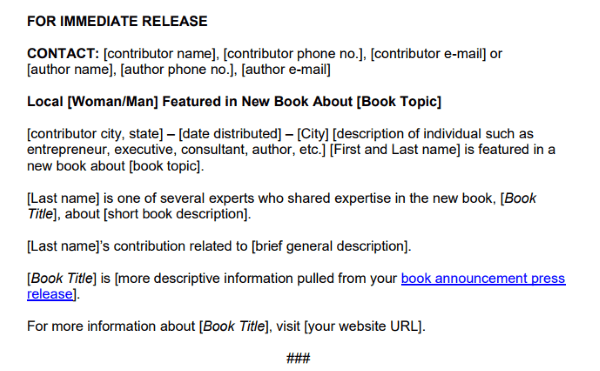By Sandra Beckwith
When Champion Products sponsored the Women’s Basketball Coaches Association’s Player of the Year Awards for the NCAA’s five college divisions in the U.S., I was responsible for publicizing the award nominees in their hometown media.
To get the most publicity possible for the authentic athletic wear brand and the athletes, I used what marketers would now call a “hyper-local” approach.
Another publicist probably would have created one press release naming all 25 nominees and sent that announcement to a mass media list. But I knew that with publicity (as with many other things), personalization was the key to success.
I knew I had to make it instantly clear to every hometown media outlet that the press release I sent contained local news for a local audience. To do that, I created a fill-in-the-blanks press release template that I merged with a database containing relevant specifics about each athlete. All I had to do was press a few keys to produce each nominee’s hometown press release.
Because of this customized approach, each nominee (and the subsequent five winners) received the hometown newspaper and TV news attention they deserved.
Do this for sources quoted in your book
You can use this tactic to generate local market publicity for anyone you quoted or referenced in your nonfiction book, too.
Whether it’s an expert source or a short profile in a sidebar, you can create a press release showcasing that individual’s contribution and send it to their local media outlets.
To get you started, here’s a sample fill-in-the-blanks press release I created for you. Because it’s so generic, you’ll want to make sure your resulting press release for each source reads well and makes sense, but that won’t be hard.

Click here to download and save the template: Template press release for sources
How to use it
Once you’ve completed each source’s press release, send it to the appropriate media contacts in each community. Do this with email by copying and pasting the text into the e-mail message.
For this type of news, you’ll send it to newspapers and radio stations, but not TV stations. (TV news doesn’t use this type of information.)
Consider asking your source for help with the names of local media contacts. If that’s not possible, you can get everything you need with an online search for local media outlets.
At each outlet, send it to:
- Radio stations: Producer of morning drive-time programming or a specific talk show producer
- Daily newspaper: The appropriate beat reporter or section editor, depending on the book’s topic (lifestyle? religion? business? education?) and the local section editor
- Weekly newspaper: Editor
Don’t overlook those weekly newspapers. Weeklies are incredibly well-read in their micro-communities. They love this kind of news, too. And, because most publicists overlook them because of their small circulation, there’s less competition for space.
Weeklies are also ideal in major markets where this kind of information won’t get used – New York City, Los Angeles, Chicago, and so on. Drill down to the actual community or neighborhood your source lives in and find the weekly that serves that smaller area. (Your source can help with this.)
It’s worth the effort
There’s no question that this will take a little time and effort. But I have used this hyper-local approach time and time again (and won both a national and a local publicity award for a client project in the process). I know it works.
The best part? It won’t cost you a thing. All you need is time.
Give it a try. Getting your book mentioned in even one newspaper – all while shining a light on your expert source – makes it worthwhile. You can’t lose.
Have questions about how to do this? Ask them here.
Photo: BigStockPhoto


